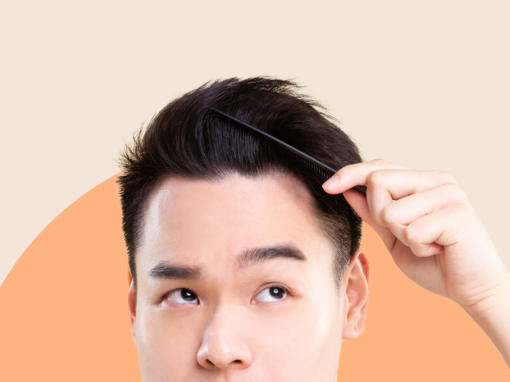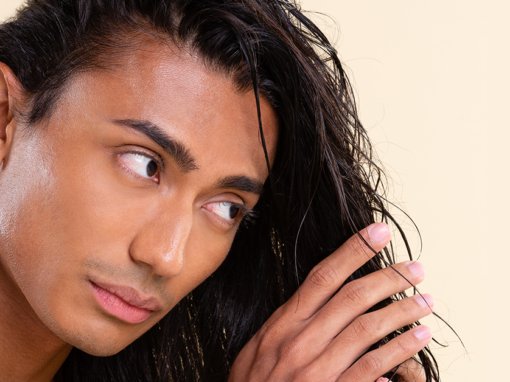Dry scalps can cause great discomfort. Besides the urge to scratch it, the dry scalp may sometimes be related to hair loss. If you are experiencing itchiness and dryness along with thinning hair, you must take the necessary actions to nourish your hair. Read this article to understand What a dry scalp is, whether it is connected with the problem of hair loss, and how you can get rid of it.
What is a dry scalp?
A dry scalp is the absence of moisture in the hair scalp. It generally results from stress and ageing, but it is also observed as a reaction to hair products, which draws the moisture and oil out of your scalp and causes the skin to flake off.
People often confuse dry scalp and dandruff as both cause visible flakiness, but a subtle difference can be observed. Scalp skin flakes are dry and white, while dandruff flakes look oily and yellow.
Causes of dry scalp
Let’s dive into what causes a dry scalp.
- Scalp psoriasis
Red, scaly patches on the scalp characterise scalp psoriasis. It can cause itching, discomfort, and even hair loss. Seeking medical treatment and using prescribed medications can help manage the symptoms effectively.
- Seborrheic dermatitis
Seborrheic dermatitis is a common skin condition that causes scalp redness, flaking, and itching. It can be treated using gentle shampoos, avoiding harsh hair products, and anti-fungal treatments.
- Diet
A poor diet with a deficiency of omega-3 fatty acids and vitamins can promote disease development. Hence taking foods enriched with vitamins is necessary.
- Scalp ringworm
Scalp ringworm is a fungal infection affecting the scalp, leading to red and circular patches that can cause aggressive itching, which results in dry scalps.
- Hair products
Using products with harsh chemicals or odours for a long time worsens scalps and causes dry scalps. Hence choosing the right hair care products is essential for maintaining a healthy scalp.
- Styling habits
Certain styling habits can contribute to scalp problems. Avoid tight hairstyles that pull on the scalp, which can cause irritation. Avoid using heat styling tools, as excessive heat can dry out the scalp. Practising good hygiene by regularly washing your hair can help prevent the buildup of oil, dirt, and sweat on the scalp. Use a soft microfiber towel and a comb with soft bristles to detangle hair gently.
How dry scalp can lead to hair loss?
When a person has scars on their scalp, it can lead to intense itching. The scar tissue damages the skin’s nerves, causing discomfort and aggressive itching that causes hair fall. Additionally, fungal infections and allergic reactions to dry scalp can cause hair loss.
In most cases, dry scalp occurs independently but may sometimes be linked with hair loss. Relevant reasons are:
- Scalp irritation and hair breakage:
A dry scalp can lead to itching and irritation, frequently causing an urge to scratch the scalp. When done forcefully, the scratching motion can weaken the hair strands and result in breakage, which leads to hair fall.
- Disruption of hair follicle health:
A dry scalp lacks moisture and can affect the health of hair follicles. When the follicles don’t receive enough hydration and nourishment, they become weak and cause hair fall.
- Imbalanced sebum production:
The scalp produces sebum, natural oil that moisturises and protects the hair and scalp. A dry scalp disrupts sebum production, leading to an imbalance. Insufficient sebum can make the hair dry and cause hair fall.
How to treat dry scalp leading to hair loss?
- Hair massage
Give yourself a gentle oil massage using your fingers in a circular motion. Scalp massage works better by stimulating natural oil production and improving blood circulation to the hair follicles. The blood flow brings more moisture and nutrition to the hair, which helps remove dead skin and keep hair growth healthy.
- Use the right hair care products
Shampoo, hair oil, conditioner, serum, and other hair care products are crucial in nourishing the scalps. Always pick the right hair care product containing glycerin, aloe vera, tea tree, shea butter, and egg protein. Opt for gentle, sulphate-free shampoos and other products that are suitable for your scalp condition.
- Change your diet and stay hydrated
A poor diet with a deficiency of zinc, Vitamin-A, and omega-3, can be a leading cause of dry scalp. Over-consumption of sugar promotes the yeast’s growth and contributes to the condition. Many people have found relief from the dry scalp by taking a healthy and well-balanced diet. It is suggested to take vegetables, eggs, fruits, and dairy products as they are excellent sources of necessary nutrients.
Staying dehydrated also affects the skin and causes dry scalps; hence, drinking at least six to eight glasses of water daily is suggested for optimal hydration.
FAQs related to dry scalp hair loss
- Does hair loss from dry scalp grow back?
Hair loss caused by dry scalps returns once the underlying disease is resolved.A Dry scalp leads to hair thinning, which is usually temporary and reversible. Taking steps to moisturise and nourish the scalp, such as using chemical-free shampoos, a healthy diet, and staying hydrated, can help promote healthy hair growth.
- When should I be worried about a dry scalp?
If you experience extensive itching and patches on other parts of the body, then you must consult a doctor.
- Should you wash your dry scalp every day?
It is suggested not to overwash your scalp as it may cause harm to hair and leads to hair fall. Washing the hair less often helps preserve the scalp’s moisture and nourish them. Opt for gentle, sulphate-free shampoos and other products that are suitable for your scalp condition.
This article is for informational purposes only and does not constitute medical advice. The information contained herein is not a substitute for and should never be relied upon for professional medical advice. Book a consultation with andSons medical team to learn more about healthcare treatments here.


